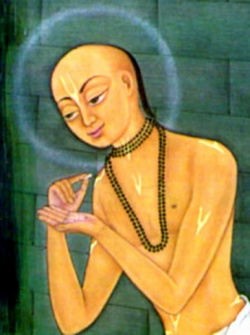Difference between revisions of "Vidhura"
| Line 1: | Line 1: | ||
[[File:Raghunatha 19030.jpg|thumb|250px|]] | [[File:Raghunatha 19030.jpg|thumb|250px|]] | ||
| + | |||
| + | |||
| + | |||
'''[[Vidhura]]''' | '''[[Vidhura]]''' | ||
| + | |||
| + | |||
1. [[Vidhura]]. A [[brahmin]], chaplain of the [[king]] of [[Benares]]. For details see the [[Sambhava Jātaka]]. He is identified with [[Mahā Kassapa]] (J.v.67). [[Vidhura's]] son was [[Bhadrakāra]]. J. v.60. | 1. [[Vidhura]]. A [[brahmin]], chaplain of the [[king]] of [[Benares]]. For details see the [[Sambhava Jātaka]]. He is identified with [[Mahā Kassapa]] (J.v.67). [[Vidhura's]] son was [[Bhadrakāra]]. J. v.60. | ||
| − | 2. [[Vidhura]]. The [[Bodhisatta]] born as the [[minister]] of Dhanañjaya-Korabba. See the [[Vidhurapandita Jātaka]]. | + | 2. [[Vidhura]]. The [[Bodhisatta]] born as the [[minister]] of [[Dhanañjaya-Korabba]]. See the [[Vidhurapandita Jātaka]]. |
| − | His father was the [[brahmin]] [[Canda]] (J.vi.262), and he owned three {{Wiki|palaces}}: Koñca, Mayūra and Piyaketa (J.vi.289). | + | His father was the [[brahmin]] [[Canda]] (J.vi.262), and he owned three {{Wiki|palaces}}: [[Koñca]], [[Mayūra]] and [[Piyaketa]] (J.vi.289). |
| − | [[Anujjā]] was his wife and Cetā his daughter in law; among his sons was [[Dhammapāla]] (J.vi.290). | + | [[Anujjā]] was his wife and [[Cetā]] his daughter in law; among his sons was [[Dhammapāla]] (J.vi.290). |
In one place (J.vi.301) he is spoken of as having one thousand wives and seven hundred {{Wiki|female}} slaves. | In one place (J.vi.301) he is spoken of as having one thousand wives and seven hundred {{Wiki|female}} slaves. | ||
| − | The [[Vidhurapandita]] of the | + | The [[Vidhurapandita]] of the [[Dhūmakāri Jātaka]] is probably [[identical]] with the above, as also the [[minister]] of the same [[name]] in the Dasabrāhmana [[Jātaka]]. The [[latter]] contains a long [[discussion]] between [[Vidhūra]] and the [[Korabba]] [[king]] regarding the qualities of a true [[brahmin]]. |
| + | |||
| + | 3. [[Vidhura]]. The [[Milinda-Pañha]] (p.202) refers to a [[birth]] of the [[Bodhisatta]] in which he was a [[wise]] man ([[pandita]]) named [[Vidhura]]. At that [[time]] [[Devadatta]], although a jackal, brought the {{Wiki|kings}} of all [[Jambudīpa]] under his sway. | ||
| + | |||
| + | The reference is evidently to the [[Sabbadātha Jātaka]] (No. 241), but there the [[Bodhisatta's]] [[name]] is not given. | ||
| − | + | 4. [[Vidhura]]. | |
| − | + | See also [[Vidhūra]]. | |
{{R}} | {{R}} | ||
[http://what-buddha-said.net/library/DPPN/vy/vidhura.htm what-buddha-said.net] | [http://what-buddha-said.net/library/DPPN/vy/vidhura.htm what-buddha-said.net] | ||
[[Category:Buddhist Terms]] | [[Category:Buddhist Terms]] | ||
[[Category:Bodhisattva's]] | [[Category:Bodhisattva's]] | ||
Latest revision as of 10:44, 13 December 2015
1. Vidhura. A brahmin, chaplain of the king of Benares. For details see the Sambhava Jātaka. He is identified with Mahā Kassapa (J.v.67). Vidhura's son was Bhadrakāra. J. v.60.
2. Vidhura. The Bodhisatta born as the minister of Dhanañjaya-Korabba. See the Vidhurapandita Jātaka.
His father was the brahmin Canda (J.vi.262), and he owned three palaces: Koñca, Mayūra and Piyaketa (J.vi.289).
Anujjā was his wife and Cetā his daughter in law; among his sons was Dhammapāla (J.vi.290).
In one place (J.vi.301) he is spoken of as having one thousand wives and seven hundred female slaves.
The Vidhurapandita of the Dhūmakāri Jātaka is probably identical with the above, as also the minister of the same name in the Dasabrāhmana Jātaka. The latter contains a long discussion between Vidhūra and the Korabba king regarding the qualities of a true brahmin.
3. Vidhura. The Milinda-Pañha (p.202) refers to a birth of the Bodhisatta in which he was a wise man (pandita) named Vidhura. At that time Devadatta, although a jackal, brought the kings of all Jambudīpa under his sway.
The reference is evidently to the Sabbadātha Jātaka (No. 241), but there the Bodhisatta's name is not given.
4. Vidhura.
See also Vidhūra.
